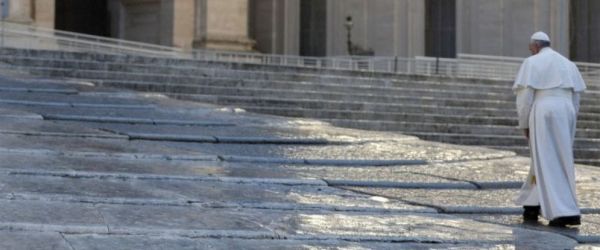[...] The liturgy invites us to reflect on the experience of Mary, Joseph and Jesus, united by an immense love and inspired by great trust in God. Today’s Gospel passage (cf. Lk 2:41-52) recounts the journey of the family of Nazareth to Jerusalem, for the celebration of Passover. But, on the return journey, the parents realize that their 12-year-old son is not in the caravan. After three days of searching and fear, they find him in the temple, sitting among the teachers, focused on a discussion with them. At the sight of the Son, Mary and Joseph “were astonished” (v. 48) and the Mother revealed their fear to him, saying: “your father and I have been looking for you anxiously” (ibid.)
Astonishment — they “were astonished” — and anxiety — “your father and I, anxious” — are the two elements to which I would like to call your attention: astonishment and anxiety.
In the family of Nazareth astonishment never waned, not even in a dramatic moment such as Jesus being lost: it is the ability to be astonished before the gradual manifestation of the Son of God. It is the same astonishment that even strikes the teachers of the temple, “amazed at his understanding and his answers” (v. 47). But what is astonishment; what is it to be astonished? Being astonished and being amazed is the opposite of taking everything for granted; it is the opposite of interpreting the reality that surrounds us and historical events according to our criteria alone. A person who does this does not know what amazement is, what astonishment is. Being astonished is being open to others, understanding others’ reasons: this attitude is important for mending compromised interpersonal relationships, and is also indispensable for healing open wounds in the familial environment. When there are problems in families, we take for granted that we are right and we close the door to others. Instead, it is important to think: ‘What is good about this person?’, and to be astonished by this ‘good’. And this helps family unity. If you have problems in the family, think about the good things in the family member with whom you have problems, and be astonished by this. This will help to heal familial wounds.
The second element that I would like to grasp from the Gospel is the anxiety that Mary and Joseph felt when they could not find Jesus. This anxiety reveals Jesus’ centrality in the Holy Family. The Virgin and her husband welcomed that Son, protected him and watched him grow in age, wisdom and grace in their midst, but above all he grew in their hearts; and, little by little, their affection for him and their understanding of him grew. This is why the family of Nazareth is holy: because it was centred on Jesus; all of Mary and Joseph’s attention and concerns were directed toward him.
That anxiety that they experienced in the three days that Jesus was missing should also be our anxiety when we are distant from him, when we are distant from Jesus. We should feel anxious when we forget Jesus for more than three days, without praying, without reading the Gospel, without feeling the need of his presence and of his comforting friendship. And many times, days pass in which I do not remember Jesus. But this is bad, this is really bad. We should feel anxious when these things happen. Mary and Joseph searched for him and found him in the temple while he was teaching: for us too, it is especially in the house of God that we are able to encounter the divine Teacher and receive his message of salvation. In the Eucharistic celebration we have a living experience of Christ; he speaks to us; he offers us his Word; he illuminates us, lights our path, gives us his Body in the Eucharist from which we draw vigour to face everyday difficulties.
And today let us go home with these two words: astonishment and anxiety. Do I know how to be astonished, when I see the good things in others, and in this way resolve family problems? Do I feel anxious when I am distant from Jesus?
Let us pray for all the families in the world, especially those in which, for various reasons, peace and harmony are lacking. And let us entrust them to the protection of the Holy Family of Nazareth.
[Pope Francis, Angelus 30 December 2018]












